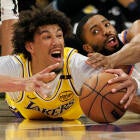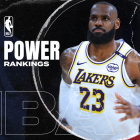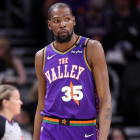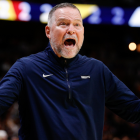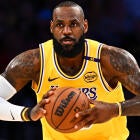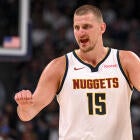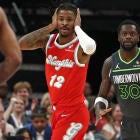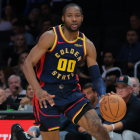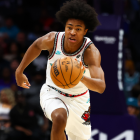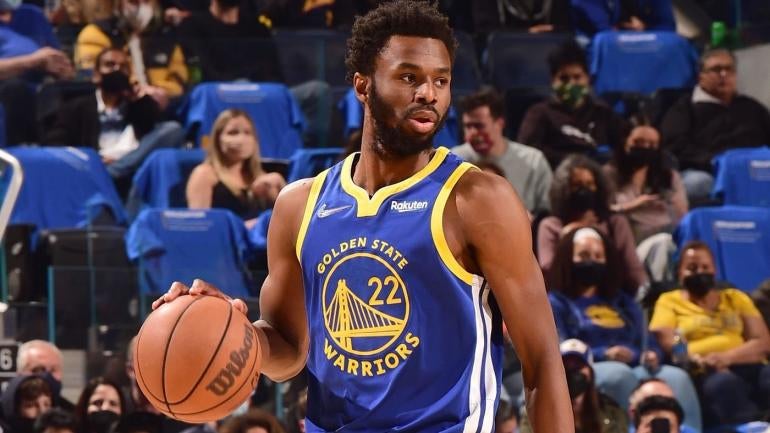
Zaza Pachulia was supposed to prevent this. When the journeyman center, buoyed by the support of his home country of Georgia, nearly started the All-Star Game in 2017, the NBA finally decided to insert some checks and balances into the voting process. Fan voting still exists, but rather than bearing the entire weight of starter selection, it now controls just 50 percent of the process. Votes from media and players are responsible for 25 percent each. That was supposed to ensure that the correct players earned one of the league's highest honors.
And yet, five years later, fans of Pachulia's former team helped boost Andrew Wiggins into a starting role. Wiggins is a far superior candidate than Pachulia was. He finished sixth in media voting and fifth among players, after all, suggesting he had a reasonable chance of making the team as a reserve. Yet few would consider Wiggins among the three best front-court players in the Western Conference even with Anthony Davis, Kawhi Leonard and Paul George missing time due to injury. The inclusion of Wiggins generated quite a few snubs in the starting five. Here are the five biggest.
Draymond Green
We can start with Wiggins' own team. Draymond Green has been the second-best Warrior this season. He beat Wiggins out in both the player vote (where he ranked third) and the media vote (fourth). But Green ranked sixth in fan voting. Wiggins ranked third. That won him the spot. Ironically, Green lost out because his own fanbase stuffed the ballot box for someone else.
Beyond points and the 14 games he's missed, there really isn't a basketball argument that favors Wiggins over Green. As much as Wiggins has improved defensively, Green is the Defensive Player of the Year favorite. He is Golden State's de facto point guard, setting up many of the easy shots that have helped vault Wiggins into this conversation with an assist from the spacing provided by Curry. Golden State is 7-7 in the games Green has missed… and 28-6 in the games he's played. If that doesn't emphasize his value to Golden State, nothing will. As good as Wiggins has been, Green is significantly more important to his team.
Karl-Anthony Towns
We go from Wiggins' current teammate in Green to his former teammate in Karl-Anthony Towns. As simplistic as this might be, Towns leads Wiggins in points, rebounds, assists, blocks, steals, field goal percentage, 3-point percentage and free-throw percentage. Box score stats don't exactly tell the whole story. If they did Green wouldn't be in the discussion here. But it goes to show just how central Towns is to what Minnesota does. The Timberwolves rely on Towns far more than the Warriors rely on Wiggins.
If Towns still struggled on defense as much as he did when he and Wiggins were teammates, this might be a bit closer, but like Wiggins, Towns has improved significantly on that end of the floor since they split. Minnesota's revamped scheme has taken better advantage of his athleticism by playing him more often on the perimeter. Towns isn't much of a rim-protector, but he's grown into a decent enough defender to support his stellar offense. He generates far more of it for Minnesota than Wiggins does for Golden State.
Rudy Gobert
If Wiggins' case revolves around his defense, Gobert, as a three-time Defensive Player of the Year still very much in his prime, should beat him out. If his case revolves around offense, it's hard to find a reason to pick Wiggins either. He scores only two more points than Gobert, but Gobert's value as a screener and diver is a huge part of what powers Utah's No. 1 ranked offense. He leads the NBA in field goal percentage and might be the NBA's best offensive rebounder.
Team performance might slightly favor Wiggins, but it's worth noting that Utah trails Golden State by just six games in the loss column. Gobert has missed seven games and the Jazz have lost six of them. That's the single biggest point in Gobert's favor. The Jazz are 12.6 points per 100 possessions better with him on the floor. They go from a championship-caliber team to a .500 also-ran the moment he goes to the bench. The Warriors are only 0.8 points per 100 possessions better with Wiggins on the floor. That's not his fault. He plays for a far deeper team than Gobert does. But if Wiggins isn't better on offense or defense and he isn't as critical to the success of his team, it's hard to justify picking him over a player as valuable as Gobert.
Chris Paul
If there's one player likely to draw vocal support for a starting nod outside of the Western Conference frontcourt, it's Chris Paul. There is a certain segment of the basketball world that believes that team success should be a significant part of the selection process, and no team has been better than Paul's Suns. At 38-9 they not only have the NBA's best record, but are on pace for an extremely impressive 66 wins on the season as a whole. Paul hasn't missed a game, and as has been the case at several of his stops, he's led the Suns to the NBA's best record (17-3) and net rating (a staggering plus-43.6) in the clutch. If your goal is simply to reward the best team in the NBA by giving them a starter, Paul is the reasonable choice considering the seven games Devin Booker missed.
But statistically speaking, Paul just isn't in Morant's stratosphere. Part of what makes the Suns so good is that Paul gets to share the ball-handling load with Booker. Morant doesn't have that luxury. Morant is averaging over 11 more points than Paul and his usage rate is nearly 13 points higher. Considering his inferior supporting talent, Morant getting the Grizzlies to 33-17 is arguably more improbable than Phoenix sitting at 38-9, and if he's going to get dinged for the Grizzlies going 10-2 without him, it should be noted that Phoenix's net rating dips only slightly from plus-9.3 to plus-6.1 when Paul sits. That's a testament to the incredible over roster that the Suns have built. The Grizzlies aren't there yet. They're far more reliant on Morant than the Suns are on Paul, and that's why Morant justifiably earned the starting nod here.
Zach LaVine
Morant vs. Paul is a pretty open-and-shut case of team success vs. individual value. Trae Young vs. Zach LaVine? That one's significantly tougher. Players on teams below .500 don't start All-Star games very often, but it would be hard to blame much of Atlanta's failures on Young. The Hawks are 3.6 points per 100 possessions worse when he sits. That's not an overwhelming number in itself, but yet again, Atlanta is failing to generate NBA-caliber offense when he's on the bench. Without Young, their offensive rating falls to a pitiful 103. Young is carrying a roster that doesn't seem all that interested in being carried.
That plays a part in explaining his raw statistical advantage over LaVine. He scores more points (27.7 to 24.9) and dishes out far more assists (9.3 to 4.3) because his team needs him to. The Hawks are built entirely around the idea that Young, by himself, can give them an elite offense, and everything else that he does on the floor is almost irrelevant. That isn't LaVine's job. He's never been the shot-creator that Young is, but he doesn't need to be. Having DeRozan and a bevy of other qualified shot-creators on his team has allowed him to focus on being an elite play-finisher. He's having the second-most efficient season of his career and outpacing Young on that front. He's a far stronger defender as well having long since graduated out of the liability status that Young still carries.
So who deserves more recognition? The great player on the great team? Or the solo act singlehandedly keeping an inferior roster afloat? This is ultimately subjective. A bit more luck on the roster front and the shoe might be on the other foot here.
![[object Object] Logo](https://sportshub.cbsistatic.com/i/2020/04/22/e9ceb731-8b3f-4c60-98fe-090ab66a2997/screen-shot-2020-04-22-at-11-04-56-am.png)









